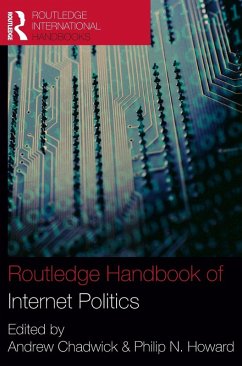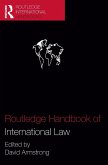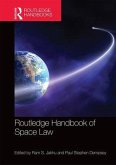Andrew Chadwick / Philip N. Howard (eds.)
Routledge Handbook of Internet Politics
Herausgeber: Chadwick, Andrew; Howard, Philip N.
Andrew Chadwick / Philip N. Howard (eds.)
Routledge Handbook of Internet Politics
Herausgeber: Chadwick, Andrew; Howard, Philip N.
- Gebundenes Buch
- Merkliste
- Auf die Merkliste
- Bewerten Bewerten
- Teilen
- Produkt teilen
- Produkterinnerung
- Produkterinnerung
The politics of the internet has entered the social science mainstream. This book deals with significant debates in Internet politics. Organized in four broad sections: Institutions, Behavior, Identities, and Law and Policy, it summarizes and criticizes contemporary debates while pointing out fresh departures.
A comprehensive set of resources, this Handbook provides linkages to established theories of media and politics, political communication, governance, deliberative democracy and social movements, all within an interdisciplinary context. Containing the latest survey data, the…mehr
Andere Kunden interessierten sich auch für
![Routledge Handbook of International Law Routledge Handbook of International Law]() David Armstrong (ed.)Routledge Handbook of International Law313,99 €
David Armstrong (ed.)Routledge Handbook of International Law313,99 €![Routledge Handbook of Energy Law Routledge Handbook of Energy Law]() Routledge Handbook of Energy Law304,99 €
Routledge Handbook of Energy Law304,99 €![Routledge International Handbook of Children's Rights Studies Routledge International Handbook of Children's Rights Studies]() Routledge International Handbook of Children's Rights Studies303,99 €
Routledge International Handbook of Children's Rights Studies303,99 €![Routledge Handbook of Law and Theory Routledge Handbook of Law and Theory]() Routledge Handbook of Law and Theory304,99 €
Routledge Handbook of Law and Theory304,99 €![Routledge Handbook on American Prisons Routledge Handbook on American Prisons]() Routledge Handbook on American Prisons301,99 €
Routledge Handbook on American Prisons301,99 €![Routledge Handbook of Space Law Routledge Handbook of Space Law]() Routledge Handbook of Space Law318,99 €
Routledge Handbook of Space Law318,99 €![Routledge Handbook of Medical Law and Ethics Routledge Handbook of Medical Law and Ethics]() Routledge Handbook of Medical Law and Ethics305,99 €
Routledge Handbook of Medical Law and Ethics305,99 €-
-
-
The politics of the internet has entered the social science mainstream. This book deals with significant debates in Internet politics. Organized in four broad sections: Institutions, Behavior, Identities, and Law and Policy, it summarizes and criticizes contemporary debates while pointing out fresh departures.
A comprehensive set of resources, this Handbook provides linkages to established theories of media and politics, political communication, governance, deliberative democracy and social movements, all within an interdisciplinary context. Containing the latest survey data, the contributors form a strong international cast of established and junior scholars.
Hinweis: Dieser Artikel kann nur an eine deutsche Lieferadresse ausgeliefert werden.
A comprehensive set of resources, this Handbook provides linkages to established theories of media and politics, political communication, governance, deliberative democracy and social movements, all within an interdisciplinary context. Containing the latest survey data, the contributors form a strong international cast of established and junior scholars.
Hinweis: Dieser Artikel kann nur an eine deutsche Lieferadresse ausgeliefert werden.
Produktdetails
- Produktdetails
- Verlag: Routledge
- Seitenzahl: 530
- Erscheinungstermin: 14. August 2008
- Englisch
- Abmessung: 250mm x 175mm x 33mm
- Gewicht: 1084g
- ISBN-13: 9780415429146
- ISBN-10: 0415429145
- Artikelnr.: 31081598
- Herstellerkennzeichnung
- Libri GmbH
- Europaallee 1
- 36244 Bad Hersfeld
- gpsr@libri.de
- Verlag: Routledge
- Seitenzahl: 530
- Erscheinungstermin: 14. August 2008
- Englisch
- Abmessung: 250mm x 175mm x 33mm
- Gewicht: 1084g
- ISBN-13: 9780415429146
- ISBN-10: 0415429145
- Artikelnr.: 31081598
- Herstellerkennzeichnung
- Libri GmbH
- Europaallee 1
- 36244 Bad Hersfeld
- gpsr@libri.de
Andrew Chadwick is Professor of Political Science and Founding Director of the New Political Communication Unit at Royal Holloway, University of London. He is the author of Internet Politics: States, Citizens, and New Communication Technologies (Oxford University Press), which won the American Sociological Association Communication and Information Technologies Section Outstanding Book Award. Philip N. Howard is Associate Professor in the Department of Communication at the University of Washington, and directs the World Information Access Project (www.wiareport.org). He is the author of New Media Campaigns and the Managed Citizen (Cambridge University Press), which won book awards from the American Sociological Association and the International Communication Association.
1. Introduction Part 1: Institutions 2. The Internet in US Election
Campaigns 3. European Political Organizations and the Internet:
Mobilization, Participation and Change 4. Electoral Web Production
Practices in Cross-National Perspective: The Relative Influence of National
Development, Political Culture, and Web Genre 5. Parties, Election
Campaigning and the Internet: Toward a Comparative Institutional Approach
6. Technological Change and the Shifting Nature of Political Organization
7. Making Parliamentary Democracy Visible: Speaking to, With and For the
Public in the Age of Interactive Technology 8. Bureaucratic Reform and
E-Government in the United States: An Institutional Perspective 9. Public
Management Change and E-Government: The Emergence of Digital Era Governance
Part 2: Behavior 10. Wired to Fact: The Role of the Internet in Identifying
Deception During the 2004 US Presidential Campaign 11. Political Engagement
Online: Do the Information Rich Get Richer and the Like-Minded More
Similar? 12. Information, the Internet and Direct Democracy 13. Toward
Digital Citizenship: Addressing Inequality in the Information Age 14.
Online News Creation and Consumption: Implications for Modern Democracies
15. Web 2.0 and the Transformation of News and Journalism Part 3:
Identities 16. The Internet and the Changing Global Media Environment 17.
The Virtual Sphere 2.0: The Internet, the Public Sphere and Beyond 18.
Identity, Technology and Narratives: Transnational Activism and Social
Networks 19. Theorizing Gender and the Internet: Past, Present, and Future
20. New Immigrants, the Internet, and Civic Society 21. One Europe,
Digitally Divided 22. Working Around the State: Internet Use and Political
Identity in the Arab World Part 4: Law and Policy 23. The Geopolitics of
Internet Control: Censorship, Sovereignty and Cyberspace 24. Locational
Surveillance: Embracing the Patterns of Our Lives 25. Metaphoric
Reinforcement of the Virtual Fence: Factors Shaping the Political Economy
of Property in Cyberspace 26. Globalizing the Logic of Openness: Open
Source Software and the Global Governance of Intellectual Property 27.
Exclusionary Rules? The Politics of Protocols 28. The New Politics of the
Internet: Multistakeholder Policy Making and the Internet Technocracy 29.
Enabling Effective Multistakeholder Participation in Global Internet
Governance Through Accessible Cyberinfrastructure 30. Internet Diffusion
and the Digital Divide: The Role of Policymaking and Political Institutions
31. Conclusion
Campaigns 3. European Political Organizations and the Internet:
Mobilization, Participation and Change 4. Electoral Web Production
Practices in Cross-National Perspective: The Relative Influence of National
Development, Political Culture, and Web Genre 5. Parties, Election
Campaigning and the Internet: Toward a Comparative Institutional Approach
6. Technological Change and the Shifting Nature of Political Organization
7. Making Parliamentary Democracy Visible: Speaking to, With and For the
Public in the Age of Interactive Technology 8. Bureaucratic Reform and
E-Government in the United States: An Institutional Perspective 9. Public
Management Change and E-Government: The Emergence of Digital Era Governance
Part 2: Behavior 10. Wired to Fact: The Role of the Internet in Identifying
Deception During the 2004 US Presidential Campaign 11. Political Engagement
Online: Do the Information Rich Get Richer and the Like-Minded More
Similar? 12. Information, the Internet and Direct Democracy 13. Toward
Digital Citizenship: Addressing Inequality in the Information Age 14.
Online News Creation and Consumption: Implications for Modern Democracies
15. Web 2.0 and the Transformation of News and Journalism Part 3:
Identities 16. The Internet and the Changing Global Media Environment 17.
The Virtual Sphere 2.0: The Internet, the Public Sphere and Beyond 18.
Identity, Technology and Narratives: Transnational Activism and Social
Networks 19. Theorizing Gender and the Internet: Past, Present, and Future
20. New Immigrants, the Internet, and Civic Society 21. One Europe,
Digitally Divided 22. Working Around the State: Internet Use and Political
Identity in the Arab World Part 4: Law and Policy 23. The Geopolitics of
Internet Control: Censorship, Sovereignty and Cyberspace 24. Locational
Surveillance: Embracing the Patterns of Our Lives 25. Metaphoric
Reinforcement of the Virtual Fence: Factors Shaping the Political Economy
of Property in Cyberspace 26. Globalizing the Logic of Openness: Open
Source Software and the Global Governance of Intellectual Property 27.
Exclusionary Rules? The Politics of Protocols 28. The New Politics of the
Internet: Multistakeholder Policy Making and the Internet Technocracy 29.
Enabling Effective Multistakeholder Participation in Global Internet
Governance Through Accessible Cyberinfrastructure 30. Internet Diffusion
and the Digital Divide: The Role of Policymaking and Political Institutions
31. Conclusion
1. Introduction Part 1: Institutions 2. The Internet in US Election
Campaigns 3. European Political Organizations and the Internet:
Mobilization, Participation and Change 4. Electoral Web Production
Practices in Cross-National Perspective: The Relative Influence of National
Development, Political Culture, and Web Genre 5. Parties, Election
Campaigning and the Internet: Toward a Comparative Institutional Approach
6. Technological Change and the Shifting Nature of Political Organization
7. Making Parliamentary Democracy Visible: Speaking to, With and For the
Public in the Age of Interactive Technology 8. Bureaucratic Reform and
E-Government in the United States: An Institutional Perspective 9. Public
Management Change and E-Government: The Emergence of Digital Era Governance
Part 2: Behavior 10. Wired to Fact: The Role of the Internet in Identifying
Deception During the 2004 US Presidential Campaign 11. Political Engagement
Online: Do the Information Rich Get Richer and the Like-Minded More
Similar? 12. Information, the Internet and Direct Democracy 13. Toward
Digital Citizenship: Addressing Inequality in the Information Age 14.
Online News Creation and Consumption: Implications for Modern Democracies
15. Web 2.0 and the Transformation of News and Journalism Part 3:
Identities 16. The Internet and the Changing Global Media Environment 17.
The Virtual Sphere 2.0: The Internet, the Public Sphere and Beyond 18.
Identity, Technology and Narratives: Transnational Activism and Social
Networks 19. Theorizing Gender and the Internet: Past, Present, and Future
20. New Immigrants, the Internet, and Civic Society 21. One Europe,
Digitally Divided 22. Working Around the State: Internet Use and Political
Identity in the Arab World Part 4: Law and Policy 23. The Geopolitics of
Internet Control: Censorship, Sovereignty and Cyberspace 24. Locational
Surveillance: Embracing the Patterns of Our Lives 25. Metaphoric
Reinforcement of the Virtual Fence: Factors Shaping the Political Economy
of Property in Cyberspace 26. Globalizing the Logic of Openness: Open
Source Software and the Global Governance of Intellectual Property 27.
Exclusionary Rules? The Politics of Protocols 28. The New Politics of the
Internet: Multistakeholder Policy Making and the Internet Technocracy 29.
Enabling Effective Multistakeholder Participation in Global Internet
Governance Through Accessible Cyberinfrastructure 30. Internet Diffusion
and the Digital Divide: The Role of Policymaking and Political Institutions
31. Conclusion
Campaigns 3. European Political Organizations and the Internet:
Mobilization, Participation and Change 4. Electoral Web Production
Practices in Cross-National Perspective: The Relative Influence of National
Development, Political Culture, and Web Genre 5. Parties, Election
Campaigning and the Internet: Toward a Comparative Institutional Approach
6. Technological Change and the Shifting Nature of Political Organization
7. Making Parliamentary Democracy Visible: Speaking to, With and For the
Public in the Age of Interactive Technology 8. Bureaucratic Reform and
E-Government in the United States: An Institutional Perspective 9. Public
Management Change and E-Government: The Emergence of Digital Era Governance
Part 2: Behavior 10. Wired to Fact: The Role of the Internet in Identifying
Deception During the 2004 US Presidential Campaign 11. Political Engagement
Online: Do the Information Rich Get Richer and the Like-Minded More
Similar? 12. Information, the Internet and Direct Democracy 13. Toward
Digital Citizenship: Addressing Inequality in the Information Age 14.
Online News Creation and Consumption: Implications for Modern Democracies
15. Web 2.0 and the Transformation of News and Journalism Part 3:
Identities 16. The Internet and the Changing Global Media Environment 17.
The Virtual Sphere 2.0: The Internet, the Public Sphere and Beyond 18.
Identity, Technology and Narratives: Transnational Activism and Social
Networks 19. Theorizing Gender and the Internet: Past, Present, and Future
20. New Immigrants, the Internet, and Civic Society 21. One Europe,
Digitally Divided 22. Working Around the State: Internet Use and Political
Identity in the Arab World Part 4: Law and Policy 23. The Geopolitics of
Internet Control: Censorship, Sovereignty and Cyberspace 24. Locational
Surveillance: Embracing the Patterns of Our Lives 25. Metaphoric
Reinforcement of the Virtual Fence: Factors Shaping the Political Economy
of Property in Cyberspace 26. Globalizing the Logic of Openness: Open
Source Software and the Global Governance of Intellectual Property 27.
Exclusionary Rules? The Politics of Protocols 28. The New Politics of the
Internet: Multistakeholder Policy Making and the Internet Technocracy 29.
Enabling Effective Multistakeholder Participation in Global Internet
Governance Through Accessible Cyberinfrastructure 30. Internet Diffusion
and the Digital Divide: The Role of Policymaking and Political Institutions
31. Conclusion








